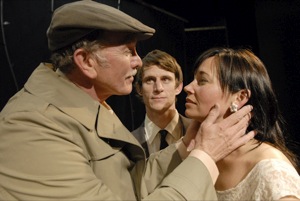-
- Methodists attend same-sex commitment ceremony
- Young religious voters hope to use faith for larger social change
- Senator says slavery would pass in a secret ballot
- Presbyterian Church clears minister in same-sex marriage case
- McGreevey divorce trial begins this week
- Officials want HIV screenings for all inmates
- National News Briefs
- World News Briefs
Theater
Laura in the dark, marriage in a muddle and Chekhov in Mexico
Published Thursday, 08-May-2008 in issue 1063
‘The Glass Menagerie’
I can think of a few reasons Tennessee Williams’ The Glass Menagerie seems a fitting farewell piece for the Cassius Carter Centre Stage, which will be leveled and rebuilt after this show is struck.
It’s about Laura Wingfield (Michele Federer), whose slight limp and extreme shyness have destroyed her psyche. Likewise, the Carter’s technological and spatial limitations have crippled its usefulness to the Globe. Laura’s fate will not change, but the theater will rise again (opening is tentatively set for January, 2010), and visitors can watch a video in the lobby of what will rise in the Carter’s space.
Meanwhile, The Glass Menagerie plays through May 18 on the Carter stage, directed by Joe Calarco.
Set in St. Louis in 1937, The Glass Menagerie was Williams’ breakthrough as a playwright, and has rightly claimed a place among the most-revived plays in the literature. Lyrically and movingly written, the play has endeared itself to generations of theatergoers with descriptions like this: “In Spain there was Guernica. But here was only hot swing music and liquor, dance halls, bars and movies, and sex that hung in the gloom like a chandelier and flooded the world with brief, deceptive rainbows.”
That’s Tom (Michael Simpson) speaking. The 20-something Tom wants lots of things: to write, see the world and have adventures, but mainly to get away from his dead-end job at the warehouse and his mother’s constant and repetitive haranguing. Tom’s father left years ago – “He was a telephone man who fell in love with long distance” – and Tom has kept food on the family table but enjoyed not a single minute of it.
The reason Tom persists is sister Laura (Michele Federer), with a psychological fragility so out of proportion to her limp that she has withdrawn into a fantasy world of glass figurines, the menagerie of the title.
Mother Amanda (Mare Winningham), the faded Southern belle who lives in the memory of the day she received 17 gentleman callers, is wistful about her own past but a bulldog about her hopes for her children, whether they share them or not. The appearance of Laura’s sole gentleman caller, Jim (Kevin Isola), will finally make Laura’s future clear to her mother.
This production suffers from Michael Fagin’s confusing and peculiar set which anyone with a real limp would have serious trouble navigating. A large round space serving as an apparent hallway connects to a long rectangular piece ending at the Carter’s steps on either end. This apparently is meant to separate the living and dining rooms, but it takes so much playing space that the whole seems obstacle-ridden. Laura’s menagerie is covered with a cloth most of the time, and the subdividing structure and excessively dingy lighting make it difficult for many audience members to see what’s going on.
Winningham’s Amanda is more of a bull than a faded belle, but she does well with the Southern accent acquired in a road trip in preparation for the role. It serves her better than a slightly whiny voice quality which I can justify dramatically but find annoying to listen to.
Federer does what she can in the first act with direction that sometimes has her on the floor by the couch, where much of the audience cannot see what she is doing, and other times sprinting up the Carter steps to make her exit. But she shines in her second-act scene with Isola’s “gentleman caller,” who turns in easily the best performance of the evening.
Michael Simpson, in his first dramatic role as Tom, seems to stride rather than drag through his days, and I didn’t get much of his inner rage.
The Glass Menagerie deserves a better setting and better direction, but the Carter could hardly have a better closing line for its last show: “Blow out your candles, Laura.”
The Glass Menagerie plays through May 18 at the Old Globe Theatre’s Cassius Carter Centre Stage. Shows Sunday, Tuesday and Wednesday at 7 p.m.; Thursday through Saturday at 8 p.m.; matinees Saturday and Sunday at 2 p.m. For tickets call 619-23-GLOBE or visit www.theoldglobe.org.
‘Prelude to a Kiss’
A doddering, unknown Old Man (Charlie Riendeau) sparks unexpected and most unwelcome changes when he shows up unbidden at a suburban wedding reception and kisses the bride. Suddenly the groom, Peter (Joshua Everett Johnson), begins to notice that his bride seems different, and by the time their Jamaica honeymoon is over he’s sure Rita (Kristianne Kurner) is someone else.
Craig Lucas’ Tony-nominated 1990 Prelude to a Kiss plays through May 18 at New Village Arts Theatre, directed by Delicia Turner Sonnenberg.
The connection made between Rita and the old man will raise questions about love, marriage and whether we can ever really know another person.
The best part of Lucas’ play is in fact the prelude to that kiss, in which these two endearing 20-somethings meet at a party, click instantly with conversation that flows naturally, even to ending each other’s sentences, and leap into a relationship that will take them down the aisle within a few months.
It seems inevitable. Peter confesses to a fondness for the devil-may-care recklessness implied in roller coaster signs that warn “Ride at your own risk,” and the notion that anything can happen.
Rita, a pessimistic insomniac bartender and former card-carrying socialist, thinks “the world’s really a terrible place” and one she is unwilling to bring children into.
A perfect match, right?
But after that fateful kiss, Rita starts going weird. In Jamaica, she says unlikely things like “You are my puppy puppy” and claims she wants to go jet-skiing and scuba diving, and it’s clear to Peter that someone has inhabited Rita’s body. Meanwhile, the Old Man takes on new life and energy.
Kurner and Johnson have chemistry to spare, and even if the clever script promises more than it delivers (after the magical beginning, it devolves into a rather standard mystery plot: will Peter be able to get his wife back?), the production is charming and wonderfully acted enough to keep us interested.
Some of the best lines are in Peter’s occasional narration. Like this, after the wedding ceremony: “There was some polite applause, as if we’d made a good putt or something.”
Jack Missett is a hoot as Rita’s dentist father (“I could pull out four wisdom teeth on a fifth of Stoli”) and Kathryn Herbruck warm and concerned as Rita’s mother. Kurner and Riendeau play their second-act pas de deux with delicacy and understatement.
One other lovely surprise is the set, designed by Esther Emery, better known as a superb director. She’s designed several curving, elegant and easily moved pieces that even interlock into a heart at one point. It’s light, airy and perfect for this play.
“How precarious time is,” says the Old Man. “And how little we realize until it’s almost gone.” This lovely production will also be gone soon. Better hurry.
Prelude to a Kiss plays through May 18 at New Village Arts Theatre in Carlsbad. Shows Thursday through Saturday at 8 p.m.; matinees Saturday at 2 p.m. and Sunday at 3 p.m. For tickets call 760-433-3245 or visit www.newvillagearts.org.
‘La Gaviota’
The purpose of art, the vagaries of loves lost, found and unrequited, family relationships and death play out against the backdrop of the Mexican revolution in La Gaviota, Claudio Raygoza’s retooling of Chekhov’s The Seagull.
Directed by Glenn Paris, the ion theatre production plays through May 17 at The Lab at the Academy of Performing Arts.
Chekhov wrote about disaffected Russians; Raygoza relocates the characters to Veracruz at the time of the 1910 revolution. These characters, on the brink of political and social change, seem only vaguely aware of and not the least bit interested in it. They’re much too busy with their convoluted romantic entanglements (of the A loves B, B loves C, C loves D variety), not so different from a contemporary soap opera.
Famous actress Irene (the redoubtable Linda Castro) is more concerned about road closures and her inability to obtain a carriage on demand than either the political situation or her son Nico (Steven Lone), a budding avant garde filmmaker.
But she is fiercely jealous of her lover, successful writer Alejandro Romero (Raygoza).
Young, depressed Michi (Estrella Esparza-Johnson), suffering with unrequited love for Nico, and the indígeno servant Yaqui (Matthew Evanoff) will eventually go off to fight in Puebla, more to escape their present ennui than out of revolutionary fervor.
The rest – physician Sergio (John Padilla), French medic Simón (Matt Scott), housekeeper Paula (Catalina Maynard), hacienda foreman Juan Carlos (John Garcia), hacienda owner and Irene’s brother Pedro (Bernard Baldan), grandma Delfina (Trina Kaplan), and up-and-coming star Nina (Sara Beth Morgan) – are variously caught up in the romantic merry-go-round (or wish they were), remaining untouched by the conflict outside except for the occasional overheard distant gunshot.
Knowing Raygoza’s concern about the serious function of art, it’s odd that he chose to play up the Chekhovian musical beds aspect rather than the trio of artistic attitudes in both scripts.
Nico persists in his avant garde film work despite familial (and apparently public) ridicule and yawns. On the other hand, Nina is ready to do anything to become as famous onstage as the commercially successful Alejandro is in print, though his success seems to have given him money and prestige but not artistic satisfaction.
Though nearly all these characters are Mexican, they are as droopy a lot as their Russian inspirations. The only one who seems happy (or at least content) is grandma Delfina, who shows more life in her brief “Cielito Lindo” dance with housekeeper Paula than the rest of these mopey characters muster in the near three-hour length of the play.
La Gaviota boasts a lovely hacienda set and appropriate costumes, though the setup for the last scene seems to take longer and be more complex than necessary.
Raygoza has a nice way with a turn of phrase. I wish he had made this play his own rather than giving us a faithful translation of Chekhovian angst to a country whose people I have never experienced as solemn or depressed.
ion theatre’s La Gaviota plays through May 17 at The Lab at the Academy of Performing Arts. Shows Thursday through Saturday at 8 p.m.; Sunday at 7 p.m. For tickets call 619-374-6894 or visit www.iontheatre.com.
|
|
Copyright © 2003-2025 Uptown Publications



